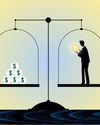
STEVE JOBS WALKED ONTO THE Macworld stage in San Francisco on Jan. 9, 2007, and announced, "Today, Apple is going to reinvent the phone." He promised that the first-generation iPhone would be available for purchase in just six months - but the prototype Jobs held in his hand was far from a finished product. His team was still working on developing a more durable touchscreen for the smartphone. Although glass was one option, Apple had been unable to find a material that did not shatter when the phone was dropped.
Immediately after the presentation, Jobs called Wendell Weeks, CEO of Corning, the company that Thomas Edison had engaged to create the glass encasements for the world's first light bulbs. Jobs gave Weeks just a few days to decide whether Corning would partner with Apple to develop a durable glass touchscreen. For Weeks, such a commitment would mean redirecting critical resources and 300 people away from the company's successful LCD business, a division delivering much-needed cash flow. He also noted a palpable fear of failure, telling me later, "There were some in the company who thought what Jobs wanted was an impossibility. If we took this on and failed, Jobs would turn Corning into a pariah because we would have been the ones who stopped the iPhone."
Corning's dilemma - how and when to divert limited resources and know-how to an unproven new product line represents a common reinvention challenge that most organizations face at some point. When successful, reinvention can lead to breakthrough innovations like Gorilla Glass, the product that emerged from Corning's decision to partner with Apple and has since been used in over 8 billion devices by more than 45 major brands.
Esta historia es de la edición Fall 2024 de MIT Sloan Management Review.
Comience su prueba gratuita de Magzter GOLD de 7 días para acceder a miles de historias premium seleccionadas y a más de 9,000 revistas y periódicos.
Ya eres suscriptor ? Conectar
Esta historia es de la edición Fall 2024 de MIT Sloan Management Review.
Comience su prueba gratuita de Magzter GOLD de 7 días para acceder a miles de historias premium seleccionadas y a más de 9,000 revistas y periódicos.
Ya eres suscriptor? Conectar

Ask Sanyin: How Do You Build for an Unpredictable Future?
While the pandemic was a wild ride of uncertainty for me and many of my peers in leadership, it feels like we never regained our footing.

What You Still Can't Say at Work
Most people know what can’t be said in their organization. But leaders can apply these techniques to break through the unwritten rules that make people self-censor.

Make Character Count in Hiring and Promoting
Most managers focus on competencies when evaluating candidates but it’s character that will transform the DNA of the organization. Here’s how to assess it.

Why Influence Is a Two-Way Street
Managers achieve better outcomes when they prioritize collaborative decision-making over powers of persuasion.

Know Your Data to Harness Federated Machine Learning
A collaborative approach to training AI models can yield better results, but it requires finding partners with data that complements your own.

How Integrating DEI Into Strategy Lifts Performance
Incorporating diversity, equity, and inclusion practices into core business planning can provide a competitive edge.

The Myth of the Sustainable Consumer
Companies that understand the different kinds of consumers for sustainable products can market to them more effectively.

A Practical Guide to Gaining Value From LLMs
Getting a return from generative AI investments requires a systematic approach to analyzing appropriate use cases.

Improve Workflows by Managing Bottlenecks
Understand whether process or resource constraints are stalling work.

Craft Schedules That Work for Everyone
Business leaders can improve retention and business performance with schedules that make sense for workers’ lives.